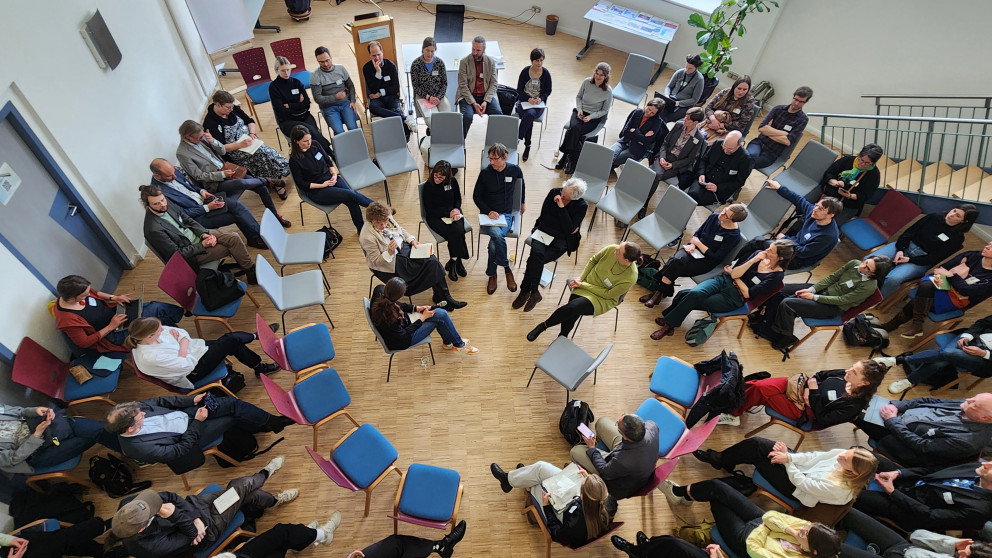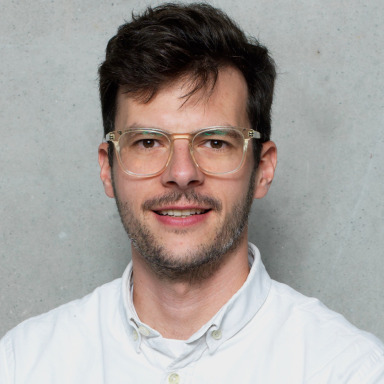New Horizons in Transdisciplinary Research
22.04.2025

Can research both engage with complex realities and be recognized by society? This was both the opening and closing question of the first annual conference of the Society for Transdisciplinary and Participatory Research (GTPF), held in early April 2025, in Frankfurt. The question speaks to one of the most pressing challenges of our time: how can research bridge the gap between the pursuit of knowledge and its ethical and social responsibilities? The answer begins where science and society embark on a shared journey.
For the past two years, the GTPF has offered more than just a platform for advocacy. Emerging from the tdAcademy, it has evolved into a vibrant space of opportunity for people from science, education, and practice who work together toward societal transformation. The conference, titled “New Horizons in Transdisciplinary Research,” brought together around 130 participants from universities, research institutes, funding bodies, ministries, civil society, and the arts. It was a rich, multi-voiced dialogue – at times serious, at times humorous – about what has been, what is, and what could be.
The first day focused on the development of transdisciplinarity (TD) over the past two decades, especially the work of the tdAcademy, which is funded by the funded by Research for Sustainability (FONA) of the Federal Ministry of Education and Resarch (BMBF) with a fellow programme funded by Robert Bosch Foundation. Once a marginal phenomenon in the scientific landscape, TD has steadily earned its place – as an approach not only to observe but also to shape reality. This shift was powerfully illustrated by State Secretary Huthmacher from the Federal Ministry of Education and Research (BMBF): as recently as 2010, TD was still considered “non-scientific” by the Ministry; today, it features in nearly every second position paper. Networking, integration, and capacity building, Huthmacher emphasized, are key to a thriving transdisciplinary community. He pointed to the Research Institute for Sustainability (RIFS) – formerly IASS – as a strong example: a transformative, transdisciplinary institute that in 2023 became part of the traditionally natural science-oriented Helmholtz Association (GFZ). This, he noted, signals structural recognition of TD in the German research system.
A response to complexity
This shift is largely driven by a clear-eyed view of today’s challenges: climate change, geopolitical instability, and digital transformation all demand new forms of knowledge production. Research that takes responsibility, that engages with societal discourse, and that generates impact(s) not just within academia, but in the broader world. How can these effects be made visible? What (quality) criteria capture societal relevance? These questions were central throughout the conference, including in a keynote by Kora Kristof (Vice President for Digitalization and Sustainability, KIT), who called for a new understanding of scientific excellence: “Excellence must be measured not only by disciplinary depth but also by the ability to collaborate and to create impact.”
For over a decade, the Karlsruhe Institute of Technology (KIT) has pursued this vision through real-world laboratories – spaces for societal innovation – in projects like “Quartier Zukunft” or AI-driven urban transformation experiments. Kristof emphasized that TD must move beyond its niche and into the mainstream of science and policy. This also means embracing discomfort: collaboration across many actors, relationship-building, slower processes, and success that may elude traditional metrics. Yet success exists – often beyond conventional indicators of excellence.
The second day looked ahead, exploring the interplay between transdisciplinarity and participatory research. While TD has become a reflective research practice, participatory research brings decades of experience in action-oriented, democracy-strengthening formats. Despite their different histories and methods, both aim to pursue research with society to foster social change. This shared ambition was voiced by Flurina Schneider (TD) and Andreas Bischof (participatory research), who argued that participation is risk-taking, present-focused, and action-driven; TD tends to be more systemic, long-term, and “intellectualised”.
Both are needed – together they can enable holistic transformations. For real change, whether internal or external, democratic competence must grow where meaningful participation is possible. Another core theme was self-reflexivity as a scientific quality criterion. How can methods, formats, and tools be tailored to specific contexts – through training, piloting, or creating spaces for targeted reflection?
During a World Café session, participants explored the work of the GTPF’s nine thematic working groups and contributed to ongoing debates. Questions included: When do methods and formats align – or clash? How can quality criteria be co-developed with practice partners? And: When is research “good enough”? These questions are only a snapshot, but they reflect what defines the GTPF: a backbone of ten working groups dealing with topics like quality assurance, institutionalization, impact, methodology, training, and research policy. More than half the society’s members are actively involved – shaping the GTPF into what it is: a dynamic, learning network committed to changing the culture of science.
The GTPF draws its roots from the tdAcademy, initiated by Institute for Social-Ecological Research (ISOE), Center Technology and Society (ZTG), Öko-Institut, and Leuphana University and funded by FONA of the Federal Ministry of Education and Resarch. After this first symposium, the work is in full swing: the community is growing, welcoming new themes, integrating international perspectives (such as through the ITD Alliance), and reimagining research – as an enabler, as infrastructure, as a policy domain.
This first annual conference sent a strong signal: the community is looking to anchor TD and participatory research within the scientific system. The TD community is calling for institutionalized real-world labs, new teaching and learning settings, tandem professorships, mentoring programs, and science prizes – in short: a research system where TD and participation no longer need explanation, but are simply part of the norm.
This requires political will, sustained funding – and above all, people. People who want to take part. People ready to rethink research alongside society.
Evoking this spirit of new beginnings, the artists Hoernemann&Walbrodt concluded the conference with a performative reflection – a gallery walk of a different kind. No pens, no notes – just bodies and senses expressing the essence of the World Café discussions. Movement. Listening. Feeling. Being – shifting from the head into the body.
The GTPF welcomes all who wish to grow with it, think with it, research with it, and co-shape society. Whether as an institutional member or an engaged individual from science, education, or practice – its doors are open. What is needed are people who build networks, who practice self-reflection, and who take responsibility – especially when future state secretaries at the BMBF may not place the same value on transformative and participatory research as today’s do.
The RIFS supports the GTPF as an institutional member. RIFS researchers from various projects actively contribute to the society and its working groups. This conference was deeply enriching for the three authors of this blog post, offering insights they now bring into their shared research area: “Advancing Transdisciplinarity and Co-Creation.”


